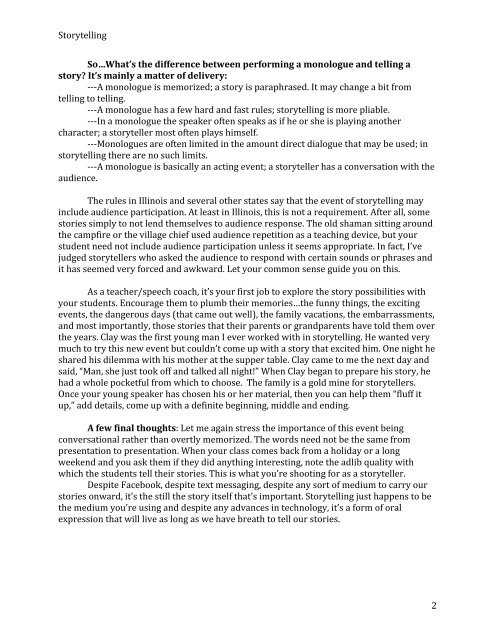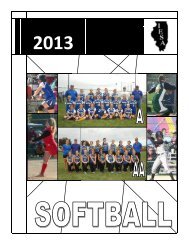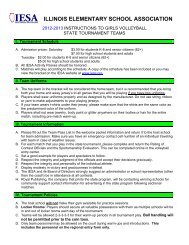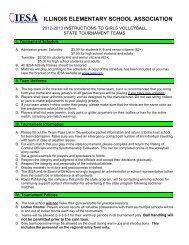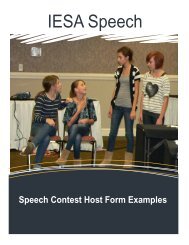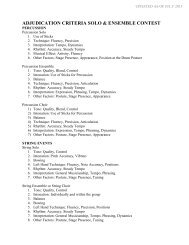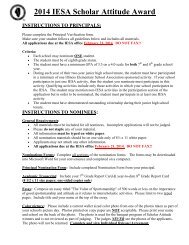Storytelling 1 Storytelling Tips By Ken Bradbury Let me begin by ...
Storytelling 1 Storytelling Tips By Ken Bradbury Let me begin by ...
Storytelling 1 Storytelling Tips By Ken Bradbury Let me begin by ...
You also want an ePaper? Increase the reach of your titles
YUMPU automatically turns print PDFs into web optimized ePapers that Google loves.
<strong>Storytelling</strong><br />
So…What’s the difference between performing a monologue and telling a<br />
story? It’s mainly a matter of delivery:<br />
‐‐‐A monologue is <strong>me</strong>morized; a story is paraphrased. It may change a bit from<br />
telling to telling.<br />
‐‐‐A monologue has a few hard and fast rules; storytelling is more pliable.<br />
‐‐‐In a monologue the speaker often speaks as if he or she is playing another<br />
character; a storyteller most often plays himself.<br />
‐‐‐Monologues are often limited in the amount direct dialogue that may be used; in<br />
storytelling there are no such limits.<br />
‐‐‐A monologue is basically an acting event; a storyteller has a conversation with the<br />
audience.<br />
The rules in Illinois and several other states say that the event of storytelling may<br />
include audience participation. At least in Illinois, this is not a require<strong>me</strong>nt. After all, so<strong>me</strong><br />
stories simply to not lend themselves to audience response. The old shaman sitting around<br />
the campfire or the village chief used audience repetition as a teaching device, but your<br />
student need not include audience participation unless it seems appropriate. In fact, I’ve<br />
judged storytellers who asked the audience to respond with certain sounds or phrases and<br />
it has see<strong>me</strong>d very forced and awkward. <strong>Let</strong> your common sense guide you on this.<br />
As a teacher/speech coach, it’s your first job to explore the story possibilities with<br />
your students. Encourage them to plumb their <strong>me</strong>mories…the funny things, the exciting<br />
events, the dangerous days (that ca<strong>me</strong> out well), the family vacations, the embarrass<strong>me</strong>nts,<br />
and most importantly, those stories that their parents or grandparents have told them over<br />
the years. Clay was the first young man I ever worked with in storytelling. He wanted very<br />
much to try this new event but couldn’t co<strong>me</strong> up with a story that excited him. One night he<br />
shared his dilemma with his mother at the supper table. Clay ca<strong>me</strong> to <strong>me</strong> the next day and<br />
said, “Man, she just took off and talked all night!” When Clay began to prepare his story, he<br />
had a whole pocketful from which to choose. The family is a gold mine for storytellers.<br />
Once your young speaker has chosen his or her material, then you can help them “fluff it<br />
up,” add details, co<strong>me</strong> up with a definite <strong>begin</strong>ning, middle and ending.<br />
A few final thoughts: <strong>Let</strong> <strong>me</strong> again stress the importance of this event being<br />
conversational rather than overtly <strong>me</strong>morized. The words need not be the sa<strong>me</strong> from<br />
presentation to presentation. When your class co<strong>me</strong>s back from a holiday or a long<br />
weekend and you ask them if they did anything interesting, note the adlib quality with<br />
which the students tell their stories. This is what you’re shooting for as a storyteller.<br />
Despite Facebook, despite text <strong>me</strong>ssaging, despite any sort of <strong>me</strong>dium to carry our<br />
stories onward, it’s the still the story itself that’s important. <strong>Storytelling</strong> just happens to be<br />
the <strong>me</strong>dium you’re using and despite any advances in technology, it’s a form of oral<br />
expression that will live as long as we have breath to tell our stories.<br />
2


